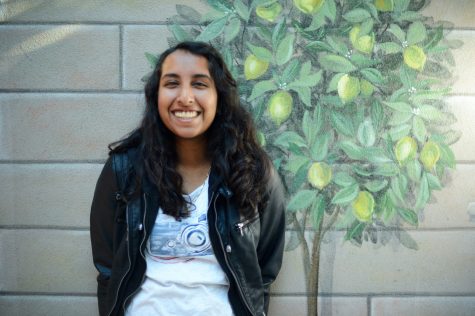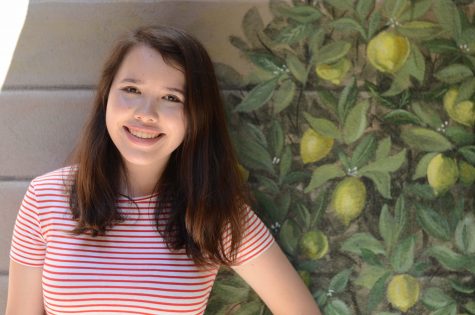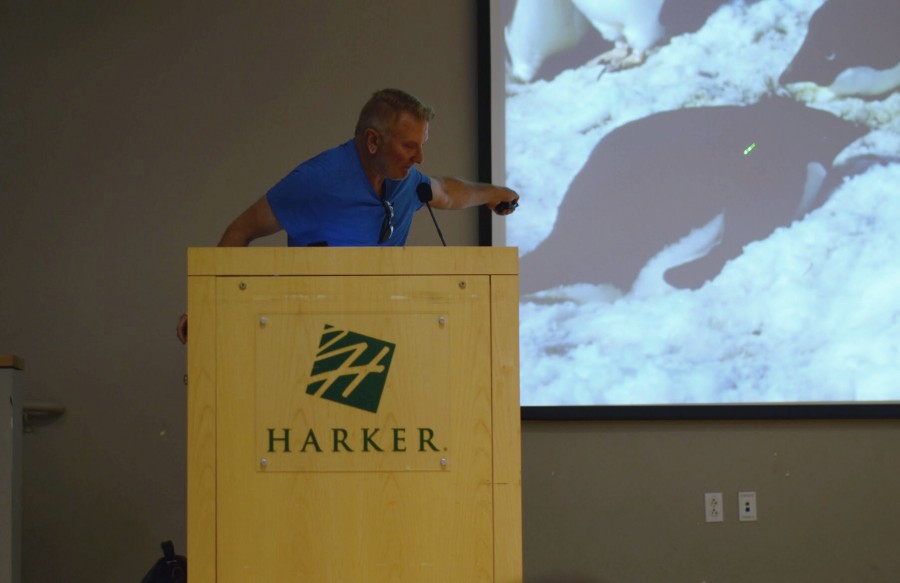Naturalist Brent Houston speaks about Arctic experiences
Naturalist Brent Houston gestures to his powerpoint as he talks about his long-term research with penguins. Houston, who traveled with 12 upper school students on the Arctic trip this past summer, spoke about the polar pack ice habitat today during long lunch.
Polar explorer and naturalist Brent Houston spoke on the importance of the endangered polar pack ice habitat today during long lunch in Nichols Atrium.
Houston accompanied 12 upper school students and two faculty members on the Arctic biology trip last summer and will lead another Harker expedition in June. In his presentation, entitled “Disappearing Sea Ice Habitat: How Warming Polar Regions affect Penguins and Polar Bears,” Houston used anecdotes and photos of his 27 years working at the poles to demonstrate the adverse effects of global climate change on the sea ice that polar ecosystems depend on.
“[Pack ice] has to form early enough, it has to be thick and complex and it has to last late enough into the summer,” Houston said. “If you don’t have that, after four or five years of bad ice, you start losing your penguins.”
Pack ice, also known as sea ice, hosts algae growth in the Arctic and Antarctic and supports the lives of caribou, seals, walruses, fish, birds, ice seals, arctic foxes, polar bears and penguins, among others. With the acceleration of global climate change, dwindling amounts of pack ice destroy colonies of certain species, like the Adelie penguin. In Houston’s time working in the Antarctic, he saw numbers of Adelie penguins decrease from 29,000 pairs to between 3,000 and 4,000.
Houston also shared his experiences working as a penguin mating researcher, photographer for National Geographic and Arctic tour guide.
“I spend most of my time pulling people away from [polar] bears that might kill them,” Houston said of the latter.
Gary Blickenstaff, upper school biology teacher and one of the faculty attendees on the Arctic trip, explained that while Houston accompanied Harker to the Arctic last summer, the naturalist will take a more active role in next summer’s expedition.
“The places we’ll be going, the boat, all that kind of stuff is very different than last year’s trip. We’re going to have better research facilities to work with than we had on this previous trip,” Blickenstaff said. “And Brent’s going to be very involved in the trip.”
Science department chair Anita Chetty invited upper school students to Houston’s talk in an announcement during Monday’s meeting, and other organizations such as UNICEF, WiSTEM and Green Team also encouraged their members to attend the talk. Akshay Battu (12), Green Team President and student on the Arctic trip, sent an email to members of Green Team prior to the presentation urging them to attend, sharing a personal anecdote from when he first met Houston.
“I think that Brent gave a really personal touch to experiences in the Arctic and Antarctic,” Akshay said. “If someone just came by and told us about research in the pack ice, it wouldn’t help, but because he showed us so many pictures and told us a lot of his anecdotes in the Arctic, it really gets people more interested in trying to help the environment and save the pack ice and the animals on it.”
After the presentation, Elena Bronder-Chang (11), another student who attended the Arctic trip this past summer, reflected on how Houston’s talk on the melting pack ice and destruction of polar habitats changed her outlook on climate change in the Arctic.
“It was really great hearing him again,” Elena said. “Before I didn’t know much about climate change, but now I realize how horrible it might get.”
The upper school science department will host an informational meeting next Tuesday at 5 p.m. in Nichols Auditorium for students interested in attending the two week Arctic research expedition this summer.

Kshithija “KJ” Mulam (12) is the Winged Post Editor-in-Chief. Serving as the Winged Post News Editor in her junior year, Winged Post Photo Editor in...

Meilan Steimle (12) is co-Editor-in-Chief of the Winged Post. She was a reporter her freshman year, Winged Post Opinion Editor her sophomore year and Winged...


















![“[Building nerf blasters] became this outlet of creativity for me that hasn't been matched by anything else. The process [of] making a build complete to your desire is such a painstakingly difficult process, but I've had to learn from [the skills needed from] soldering to proper painting. There's so many different options for everything, if you think about it, it exists. The best part is [that] if it doesn't exist, you can build it yourself," Ishaan Parate said.](https://harkeraquila.com/wp-content/uploads/2022/08/DSC_8149-900x604.jpg)




![“When I came into high school, I was ready to be a follower. But DECA was a game changer for me. It helped me overcome my fear of public speaking, and it's played such a major role in who I've become today. To be able to successfully lead a chapter of 150 students, an officer team and be one of the upperclassmen I once really admired is something I'm [really] proud of,” Anvitha Tummala ('21) said.](https://harkeraquila.com/wp-content/uploads/2021/07/Screen-Shot-2021-07-25-at-9.50.05-AM-900x594.png)







![“I think getting up in the morning and having a sense of purpose [is exciting]. I think without a certain amount of drive, life is kind of obsolete and mundane, and I think having that every single day is what makes each day unique and kind of makes life exciting,” Neymika Jain (12) said.](https://harkeraquila.com/wp-content/uploads/2017/06/Screen-Shot-2017-06-03-at-4.54.16-PM.png)








![“My slogan is ‘slow feet, don’t eat, and I’m hungry.’ You need to run fast to get where you are–you aren't going to get those championships if you aren't fast,” Angel Cervantes (12) said. “I want to do well in school on my tests and in track and win championships for my team. I live by that, [and] I can do that anywhere: in the classroom or on the field.”](https://harkeraquila.com/wp-content/uploads/2018/06/DSC5146-900x601.jpg)
![“[Volleyball has] taught me how to fall correctly, and another thing it taught is that you don’t have to be the best at something to be good at it. If you just hit the ball in a smart way, then it still scores points and you’re good at it. You could be a background player and still make a much bigger impact on the team than you would think,” Anya Gert (’20) said.](https://harkeraquila.com/wp-content/uploads/2020/06/AnnaGert_JinTuan_HoHPhotoEdited-600x900.jpeg)

![“I'm not nearly there yet, but [my confidence has] definitely been getting better since I was pretty shy and timid coming into Harker my freshman year. I know that there's a lot of people that are really confident in what they do, and I really admire them. Everyone's so driven and that has really pushed me to kind of try to find my own place in high school and be more confident,” Alyssa Huang (’20) said.](https://harkeraquila.com/wp-content/uploads/2020/06/AlyssaHuang_EmilyChen_HoHPhoto-900x749.jpeg)



